
Garmin’s Fenix 7 series smartwatches are among the best outdoor smartwatches on the market. In addition to the Fenix 7, 7S and 7X, Garmin also introduced the Epix 2 in 2022, which brings a long-awaited change to the display. But what advantages do the new models offer? And most importantly – what are the main changes compared to the Fenix 6 models? Let’s dive into the comparison between the Fenix 6 and Fenix 7 series.
On January 18, Garmin introduced the new models of the Fenix-7 series. Included are the Fenix 7, Fenix 7X and Fenix 7S models – each in an additional solar version. In addition, there is finally a high-end smartwatch from Garmin with an AMOLED display, the Epix 2. Let’s start with a table:
Garmin Fenix 7 vs. Fenix 6 in a nutshell
| 2022 model | 2019 model | AMOLED model (2022) | |
|---|---|---|---|
| Product | Garmin Epix 2 | ||
| Picture | 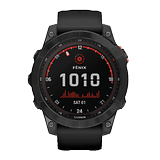 |
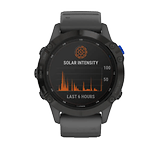 |
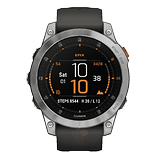 |
| Evaluation | Garmin Fenix 7 review |
not tested |
Garmin Epix 2 review |
| Material | Gorilla Glass, Sapphire crystal, or Power Glass Stainless steel, or titanium bezel Polymer case with metal rear cover Silicone strap Silicone, leather, fabric, suede, or metal band |
Gorilla Glass, Sapphire crystal, or Power Glass Stainless steel, carbon-coated steel, or titanium bezel Polymer case with metal rear cover Silicone or titanium strap Silicone, leather, fabric, titanium, nylon, or metal band |
Gorilla Glass or Sapphire crystal Stainless steel or titanium bezel Polymer case with metal rear cover Silicone strap Silicone, leather, fabric, titanium, nylon, or metal band |
| Display size and resolution | 1.2”, 240 x 240 pixels (42 mm model: 6S/7S) 1.3”, 260 x 260 pixels (47 mm model: 6/7) 1.4”, 280 x 280 pixels (51 mm model: 6X/7X) |
1.3”, 416 x 416 pixels | |
| Display type | Transflective MIP LCD | AMOLED display | |
| Water rating | 10 ATM | ||
| Storage | 16 GB 32 GB (Sapphire models) |
32 GB | 16 GB 32 GB (Sapphire models) |
| Health monitoring | Heart rate Respiration rate Blood oxygen saturation Sleep |
Heart rate Respiration rate Blood oxygen saturation Sleep |
Heart rate Respiration rate Blood oxygen saturation Sleep |
| Other sensors | GPS / Glonass / Galileo Altimeter Compass Gyroscope Accelerometer Thermometer |
GPS / Glonass / Galileo Altimeter Compass Gyroscope Accelerometer Thermometer |
GPS / Glonass / Galileo Altimeter Compass Gyroscope Accelerometer Thermometer |
| Battery life (regular model) |
42 mm (7S): – Smartwatch: Up to 11 days – Battery saver mode: Up to 38 days – GPS only: Up to 37 hours 47 mm (7):
|
42 mm (6S): – Smartwatch: Up to 9 days – Battery saver mode: Up to 34 days – GPS only: Up to 25 hours 47 mm (6): 51 mm (6X): |
47 mm: – Smartwatch: Up to 16 days – Battery saver mode: Up to 21 days – GPS only: Up to 42 hours |
| Battery life (solar model, considering 3h/day outside with 50000 lux) |
42 mm (7S): – Smartwatch: Up to 14 days – Battery saver mode: Up to 87 days – GPS only: Up to 46 hours 47 mm (7): 51 mm (7X): |
42 mm (6S): – Smartwatch: Up to 10.5 days – Battery saver mode: Up to 59 days – GPS: Up to 28 hours 47 mm (6): 51 mm (6X): |
not available |
| Offers* | |||
Want to see the Fenix 7 and Epix 2 compared to even more Garmin watches? Then check out our overview of all Garmin smartwatches!
Garmin Fenix 7 vs 6 vs Epix 2: Hardware and sensors
Although rumors indicated the new Fenix 7 smartwatch would bring an ECG sensor, the feature is not available in the new generation. The seventh version of the Fenix also does not yet have an LTE version, but it finally has a model with an AMOLED display, namely the Epix 2.
In terms of hardware and specifications, the most welcome change is the longer battery run times in all models, reaching an estimated “1 year+” for the 7X Solar model using the battery saver mode.
Compatible accessories
| Accessories | Price | Buy |
|---|---|---|
| QuickFit bike mount | $19.99 | To Amazon* |
| HRM Pro | $129.99 | To Amazon* |
| Index S2 | $149.99 | To Amazon* |
| Charging / data cable | $24.95 | To Amazon* |
| Running Dynamics Pod | $69.99 | To Amazon* |
| Speed Sensor 2 | $39,99 | To Amazon* |
| Cadence sensor 2 | $39,99 | To Amazon* |
| Tempe – temperature wireless sensor | $30,99 | To Amazon* |
One downgrade in the Fenix 7 is the reduction of the base storage option. While all Fenix 6 models had 32 GB of storage space, the Fenix 7 line and the Epix 2 both start with 16 GB in the regular models, only offering 32 GB in the Sapphire (Solar) versions.
Garmin Fenix 7 vs. Fenix 6: Models and prices
Garmin Fenix 7 vs Fenix 6 vs Epix 2: Design and display
The Fenix 7 is available in the same overall dimensions — 42, 47, and 51 mm (1.65”, 1.85”, and 2”) — with slight changes to the thickness in the two smaller versions. Likewise, screen sizes are the same, with 1.2”, 1.3”, and 1.4” options, using the same resolutions as in the Fenix 6 series: 240 x 240, 260 x 260, and 280 x 280 pixels, respectively, for the MIP transflective LCD screen.
Garmin highlighted the new touchscreen interface in the Fenix 7. The feature is integrated into the various maps features, allowing users to move and enlarge maps, for example, as well as interacting with other features on the screen. You can still, of course, operate the Fenix 7 series and Epix 2 entirely via their mechanical buttons, which is important when wearing thick gloves, for example.
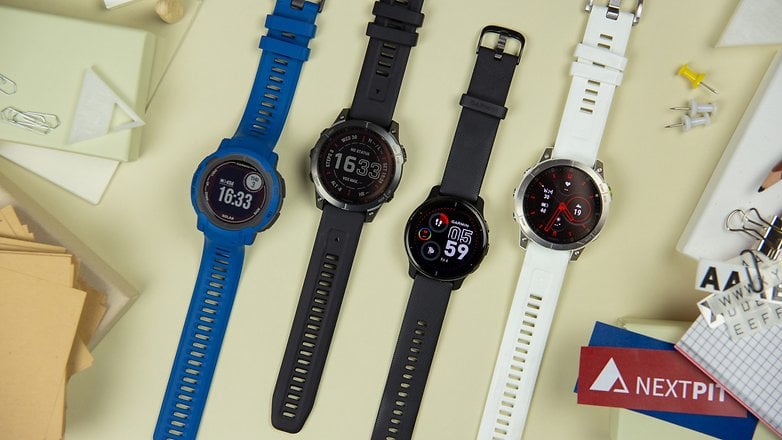
The Epix 2 brings a long-awaited feature to the Fenix class: an AMOLED display. The display simply looks much more modern and appealing with its way more colorful display (65,000 colors instead of 16 colors!) and better resolution (416 x 416 pixels). However, an AMOLED display also requires more power than a transflective display, so you will have to live with shorter battery runtimes on the Epix 2.
In terms of materials, Garmin simplified (even if just a little bit) the different material combinations for the Fenix 7 range, making Titanium available only on the Sapphire solar model, as well as removing the carbon-coated steel option for the bezel, and the Titanium strap and bands in the Fenix 7 line, in short:
- Gorilla glass + stainless steel bezel
- “Power glass” + stainless steel bezel (Solar models)
- Sapphire crystal lens + titanium bezel (Sapphire solar models)
The Epix 2 is available either as a stainless steel model with Gorilla Glass or as a titanium version with sapphire glass.
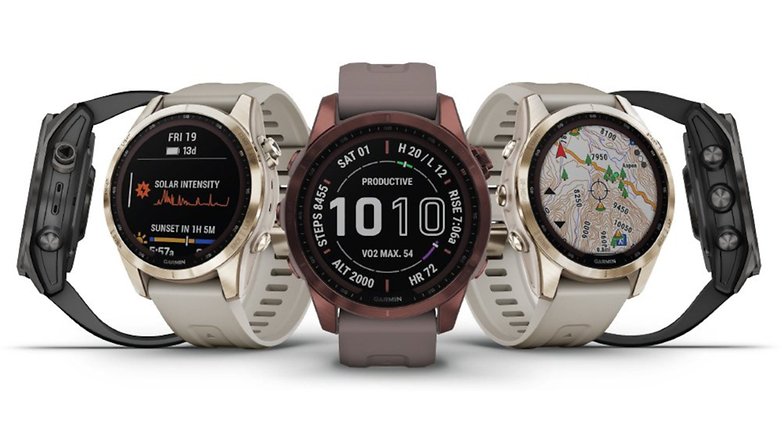
Outside of the touchscreen, the interface and usage are largely the same in the Fenix 6 and 7 models, with five main buttons around the bezel:
- Start / Stop
- Back / Lap
- Light
- Up / Menu
- Down
In general, current Fenix owners will feel at home with the new model, with a similar button arrangement that is basically the same since the first generation.
Garmin Fenix 7 and Epix 2 new features
Besides the longer battery life, the Fenix 7 brings even more features, including:
- The Connect IQ store is now browsed in the Fenix 7 smartwatch, offering watch faces, apps, and widgets without using the phone.
- HIIT Workouts – new activity profile.
- Real-time Stamina – to avoid overexerting during runs and cycling.
- Recovery Time Advisor – estimates when the owner will be recovered for the next activity.
- Up Ahead – display performance metrics, split times, and checkpoints ahead.
- Visual Race Predictor – estimate your pace during runs and shows a trend over time.
- LED flashlight (7X-only) – the bigger model also includes a multi-LED flash, that can help activities in the dark.
- Multi-band GPS/GLONASS/GALILEO support (Sapphire-only) – improved position accuracy from navigation satellites.

Conclusion
At first glance, the Fenix 7 is another discreet evolution of Garmin’s multisport smartwatch. But changes like the in-watch app store make the model even more independent. Besides that, the battery life improvements and touchscreen alone make it an interesting upgrade, especially for owners of previous generations’ models. If you want a colorful AMOLED display, there is no way around the Epix 2.
Now it’s your turn, in this comparison what is your favorite smartwatch? Garmin Fenix 7? Garmin Fenix 6? Or the Epix 2 with its beautiful AMOLED display? Let us know your opinion in the comments below.






